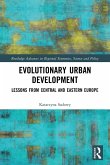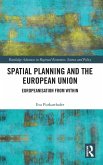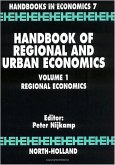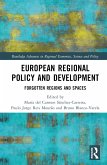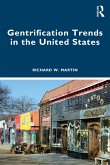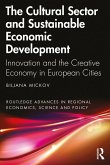Urban allometry empirically describes how "things", for example crime, GDP, emissions, energy use, area, street length, housing prices, etc. change in cities when their size, in terms of population, increases. Urban scaling is a relatively recent area of urban science, investigating how measurable characteristics of cities vary with their sizes.
This book addresses this relatively novel but highly debated topic within urban studies and geography. It presents many results, techniques, methods, and reflections on urban scaling and allometry. The sections are organized into different sub- areas such as socio- economic, infrastructural or environmental outputs, so that there is a broad organization of the findings into recognizable sub- domains. The book is particularly timely as it is becoming increasingly urgent and necessary to understand the pro and cons of different city sizes and therefore to plan policies accordingly. The book is especially interesting from a theoretical perspective because it presents the latest developments and achievements in the field, which will help to highlight potential universal rules across cities and regions.
This book will benefit researchers in urban science, and scholars entering the field from various disciplines, such as geography, sociology, economics, mathematics, physics, or urban and regional planning. It will also find an audience among practitioners and policymakers.
Chapters 2, 13 and 31 of this book are freely available as a downloadable Open Access PDF at http://www.taylorfrancis.com under a Creative Commons Attribution-Non Commercial-No Derivatives (CC-BY-NC-ND) 4.0 license.
This book addresses this relatively novel but highly debated topic within urban studies and geography. It presents many results, techniques, methods, and reflections on urban scaling and allometry. The sections are organized into different sub- areas such as socio- economic, infrastructural or environmental outputs, so that there is a broad organization of the findings into recognizable sub- domains. The book is particularly timely as it is becoming increasingly urgent and necessary to understand the pro and cons of different city sizes and therefore to plan policies accordingly. The book is especially interesting from a theoretical perspective because it presents the latest developments and achievements in the field, which will help to highlight potential universal rules across cities and regions.
This book will benefit researchers in urban science, and scholars entering the field from various disciplines, such as geography, sociology, economics, mathematics, physics, or urban and regional planning. It will also find an audience among practitioners and policymakers.
Chapters 2, 13 and 31 of this book are freely available as a downloadable Open Access PDF at http://www.taylorfrancis.com under a Creative Commons Attribution-Non Commercial-No Derivatives (CC-BY-NC-ND) 4.0 license.
"Cities are unique among all biological and socio- economic organisms. They are the one organism whose metabolism speeds up as they grow larger in size. That is a key insight from the theory of urban scaling - that cities scale superlinearly. In this edited collection, Luca Sebastiano D'Acci brings together some 60 leading international scholars in the field that apply the techniques and insights from the growing field of urban scaling to critical issues around global population growth, urbanization, and the future of global cities. Must reading for all interested in this growing crucial field."
Professor Richard Florida
, University of Toronto; author of The Rise of the Creative Class and The New Urban Crisis
"Once considered a curiosity, scaling laws are now known to be a fundamental emergent property of self- organized systems, and in particular of urban and regional systems. As a result, in recent years there has been a resurgence of interest in the scaling phenomenon as its usefulness both in understanding urban processes and in testing and validating models of these processes has become apparent. This volume brings together contributions by many of the most important researchers currently working in the field. It is therefore an essential resource for anyone interested in this increasingly important subject."
Professor Roger W. White
, Memorial University of Newfoundland; author of Modeling Cities and Regions as Complex Systems: From Theory to Applications
"This book provides a definitive set of papers from internationally leading researchers on the application of spatial science to urban areas, focusing on the fundamental issue of scaling. Different perspectives are presented covering the range of methods developed to understanding urban allometry and the dynamics of city development. It chronicles the development of urban scaling over the last 70 years, taking examples from cities across the globe, together with more detailed thematic analysis of its impacts on economics, inequality and health. A wealth of knowledge is assembled in the 32 chapters, and the book provides an authoritative contribution to our understanding of cities."
Professor David Banister
, University of Oxford
"Understanding cities, being a highly complex system- of- systems, is one of life's great challenges. Civil engineers are charged with supporting civilised life by providing constructed environments that work synergistically with the natural environment, and for this they need a rigorously garnered understanding of the nature and operation of these systems and their interdependencies. Urban scaling is a critical element of this understanding and one which this remarkable collection of perspectives uniquely provides. This book therefore provides a profound contribution to the literature and a foundation on which all urban professionals can build."
Professor Christopher D.F. Rogers
, University of Birmingham
"What we need is a theory or theories that tie all these different scaling relations together. [...] Glimpses of this theory are contained in the pages of this book and collectively they point to a greater understanding of how scaling can be used to define ways in which we can develop more sustainable and robust approaches to the design of better cities"
Professor Michael Batty
, University College London; from Michael Batty introductory chapter
Professor Richard Florida
, University of Toronto; author of The Rise of the Creative Class and The New Urban Crisis
"Once considered a curiosity, scaling laws are now known to be a fundamental emergent property of self- organized systems, and in particular of urban and regional systems. As a result, in recent years there has been a resurgence of interest in the scaling phenomenon as its usefulness both in understanding urban processes and in testing and validating models of these processes has become apparent. This volume brings together contributions by many of the most important researchers currently working in the field. It is therefore an essential resource for anyone interested in this increasingly important subject."
Professor Roger W. White
, Memorial University of Newfoundland; author of Modeling Cities and Regions as Complex Systems: From Theory to Applications
"This book provides a definitive set of papers from internationally leading researchers on the application of spatial science to urban areas, focusing on the fundamental issue of scaling. Different perspectives are presented covering the range of methods developed to understanding urban allometry and the dynamics of city development. It chronicles the development of urban scaling over the last 70 years, taking examples from cities across the globe, together with more detailed thematic analysis of its impacts on economics, inequality and health. A wealth of knowledge is assembled in the 32 chapters, and the book provides an authoritative contribution to our understanding of cities."
Professor David Banister
, University of Oxford
"Understanding cities, being a highly complex system- of- systems, is one of life's great challenges. Civil engineers are charged with supporting civilised life by providing constructed environments that work synergistically with the natural environment, and for this they need a rigorously garnered understanding of the nature and operation of these systems and their interdependencies. Urban scaling is a critical element of this understanding and one which this remarkable collection of perspectives uniquely provides. This book therefore provides a profound contribution to the literature and a foundation on which all urban professionals can build."
Professor Christopher D.F. Rogers
, University of Birmingham
"What we need is a theory or theories that tie all these different scaling relations together. [...] Glimpses of this theory are contained in the pages of this book and collectively they point to a greater understanding of how scaling can be used to define ways in which we can develop more sustainable and robust approaches to the design of better cities"
Professor Michael Batty
, University College London; from Michael Batty introductory chapter



